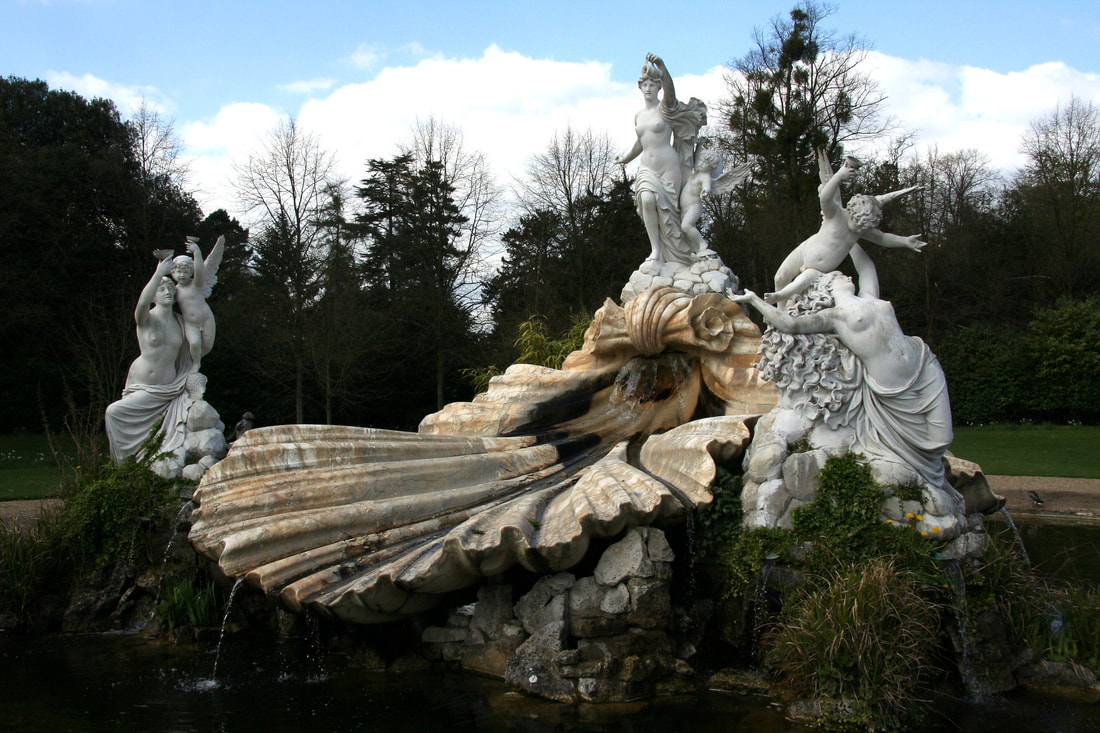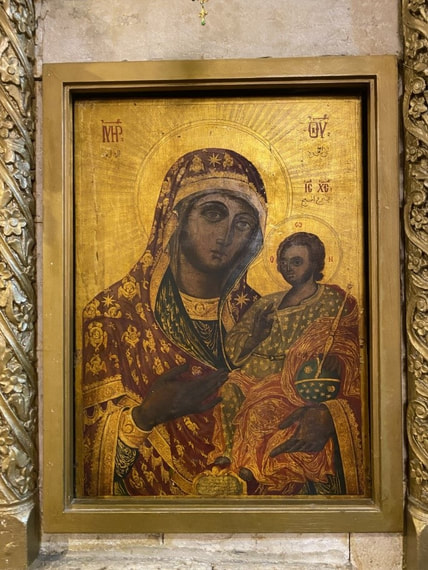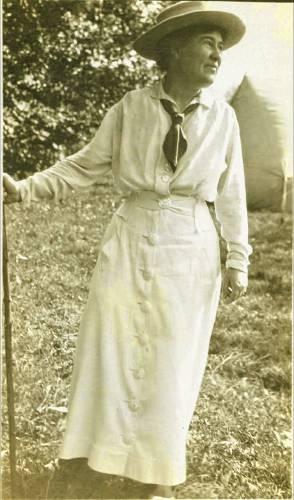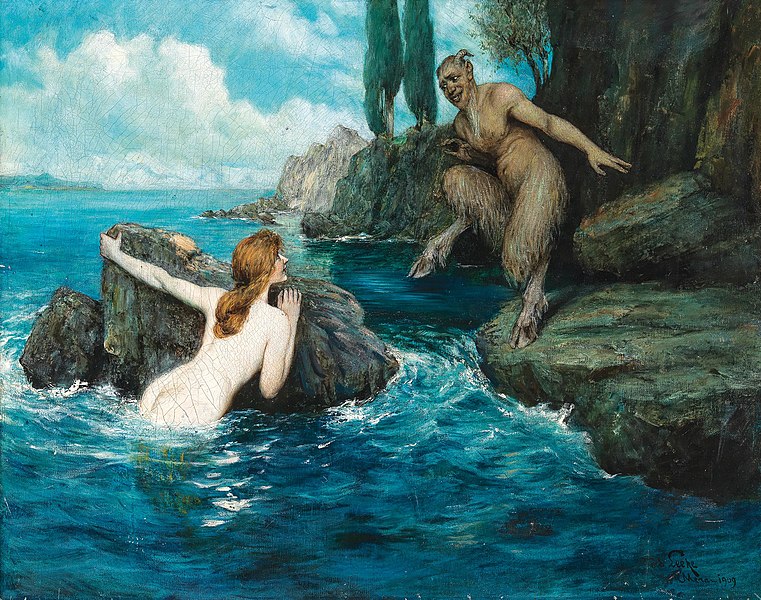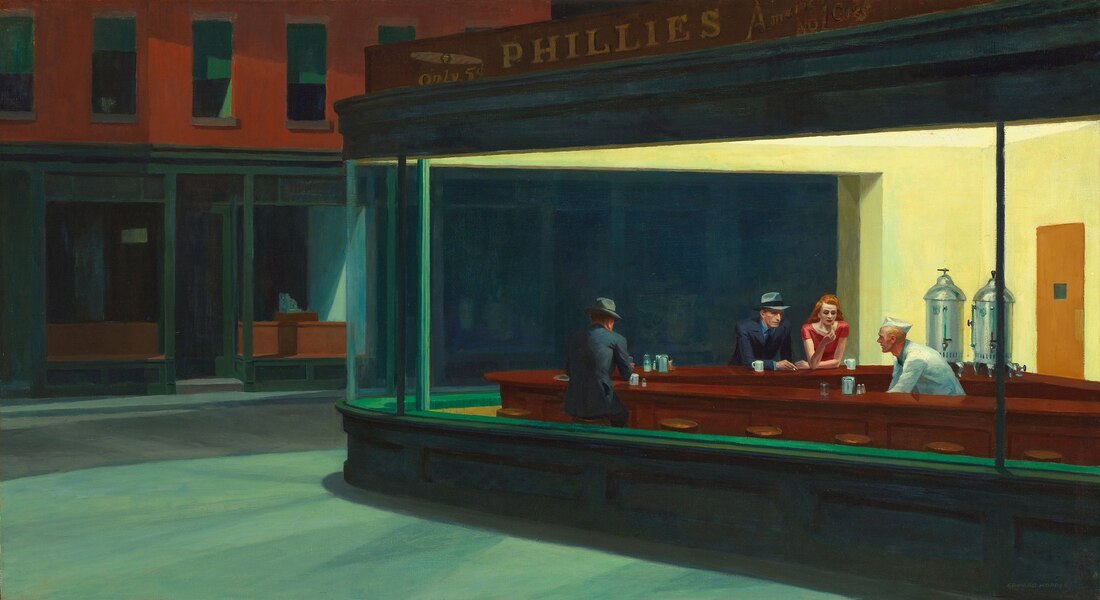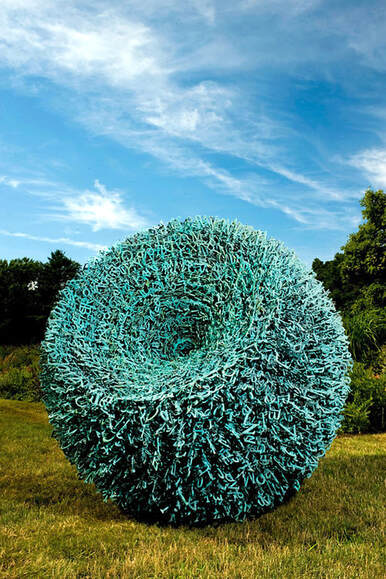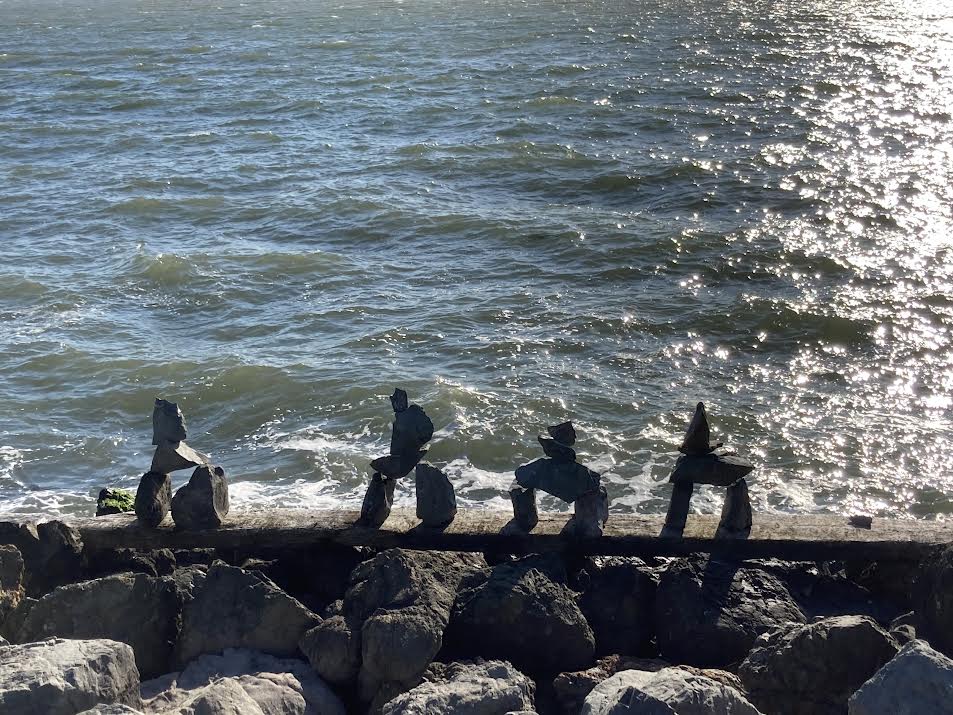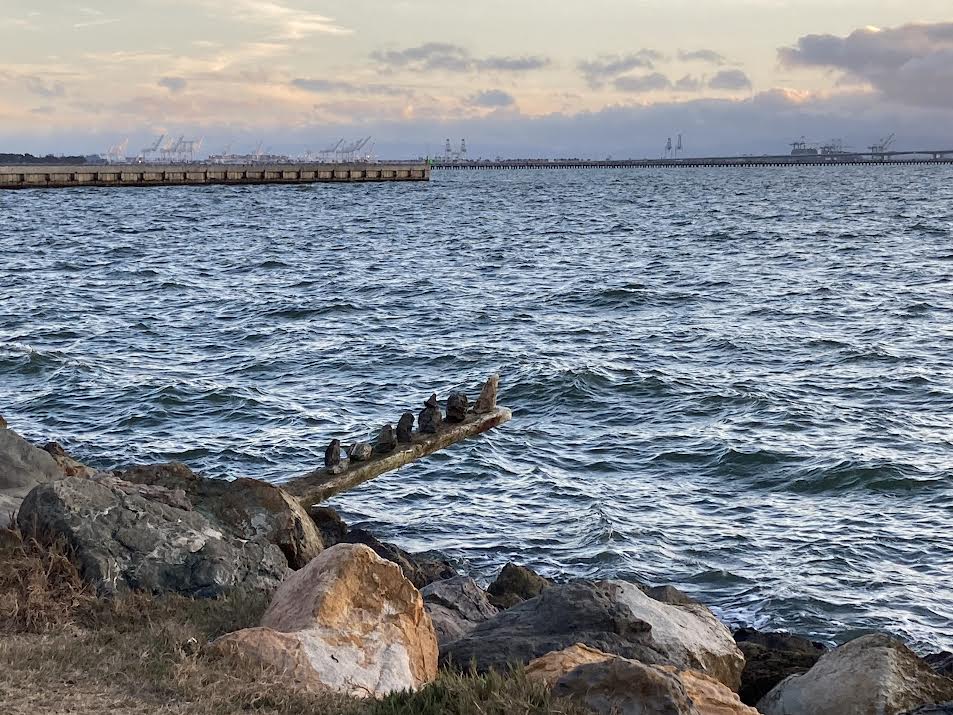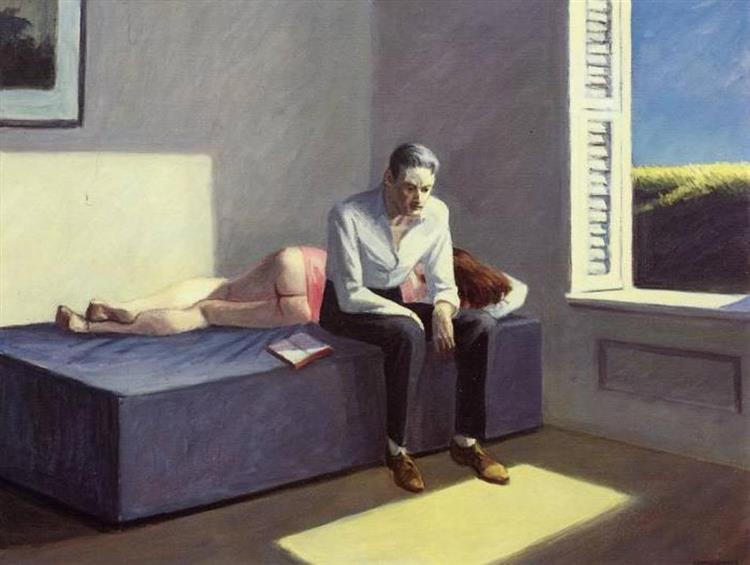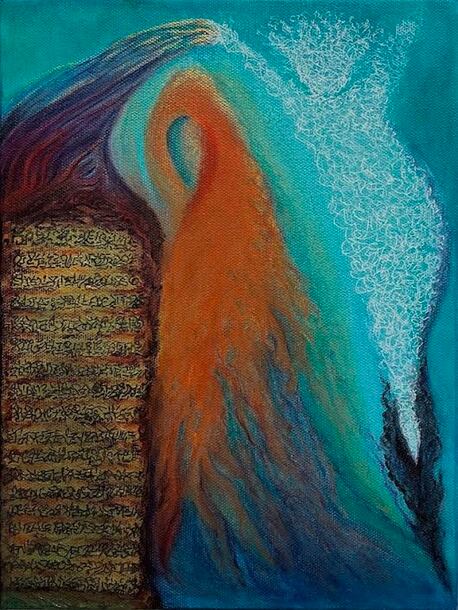|
Our Fountain in the Garden of Love 1. There’s something cold about a formal garden: the stone, the hedges, and the symmetries; the alleys and the pools; the lawns that harden into a distance where there are no trees. Did someone say this was the Garden of Love? More like the Prison. In spite of its size and gestures at breadth, one glance was enough: we wished to tear it all down with our eyes. Later, we would both grudgingly admit some features were appealing, and erase our first impressions—almost. Beauty lies in scenes like this, though on the face of it, love’s garden seems to be a hostile place. A fountain occupies the middle space (not center—many symmetries are skewed in subtle ways), projecting calm when viewed from every vantage point, not just head on. Statues with their feet planted firmly in air —a trompe l’oeil gimmick—like young lovers, stare at each other, or look across the lawn and through the water falling from above. 2. The splashing never ceases. Welling up from a series of underground pumps the many liquid pieces of light and shadow tumble out in clumps and fall to pools below. The flow, almost constant, is astonishing-- the lovers, at least, think so or would, if they could think of anything beyond what they desire. They stand there, looking through the streams that spill; they stare and never tire. The water falls around them. They stand still. The fountain bubbles higher. Each one is waiting for the other to move. (While waiting, they both froze?) “In truth,” they might lie, “we never wished to remove our expressions—or our clothes.” 3. We couldn’t gather much about them from their dress. It was the standard robe—more of a sheet or quilt-- whose virtue, it seemed, was its “Greek-” or “Roman-ness,” fashions ancient even when the fountain was built. Love, at least, hadn’t gone out of fashion—yet. (Or so the pair endeavored to impress on us.) They’d walked on air for ages now, and now the threat of falling was quite real; their union, tenuous. Who paid for upkeep of the fountain anyway? The cost must be immense. To keep Love beautiful-- not just “intact,” and not just “functioning each day”-- you need more change than lovers threw into the pool. The subject must be love, at least that much was clear. Was it? The more we looked, the more we were unsure. Why wasn’t there some modest placard posted here? a line or note on whom this thing was fashioned for? Just listening to the fountain made us drift elsewhere, even (especially?) when looking into it. The fiercer the attempt to maintain focus there, the more its sprays would hint at the inadequate power of the will to resist what it wants. Namely will-lessness, peace, repose, a childish desire to stop the world from spinning, just for once. But not once and for all. Be careful what your wish . . . the lovers whispered, but wish while you’re still here. 4. The trickling of the fountain plays tricks on the ear. It soughs like wind in leaves. Or a stream (a real stream)—so much so the listener believes and disbelieves. At times it almost seems the pair is whispering. To themselves? Or have we been caught pretending they can speak and (how rude) listening to thoughts they never thought? They’re only in our minds. And in less than a blink, they stop appearing real. They turn to stone again. And the thoughts they can’t think, the feelings they don’t feel, and all the words they never could put into speech vanish the moment when the waters of the fountain, arching upwards, reach their highest point, and then reverse their course and dwindle down to almost nothing . . . 5. A seaside town. The sun sets slowly on the bayside where houses silhouette it. (Day holds off night longer near water.) Taking in the air, the ocean swells; a fountain juggles light; and lovers’ laughter chimes like pocket change. Everything is tranquil, and something’s strange. There must be wind, for, far off, you can see wool waves disturb the surface of the sea. Perhaps a storm is coming, or perhaps just pressure dropping. “Change is in the air.” A couple waits for heaven to collapse behind the scene, continuing to stare across the water, until the light grows dim, and then make their wishes—and toss their pennies in. The subject is change. For the fountain recalls many variations of itself. Suburban malls with cascading waters; sharp scents of chlorine; rapids; pebbled brooks; artificial waterfalls in lobbies so busy they are almost serene . . . Constancy in change, perhaps? Change in constancy? The lovers neither nod assent nor disagree. The fountain chuckles softly, following its course back to itself, and then away, continually releasing all its pressures, of which it is the source. 6. At their height, fountain waters shoot from every side and fall around the centre. Opposing streams meet there, but only to divide, retreating where they enter. For a moment, it seems Chance and Fate come together (in fact, one stream’s behind). Then the streams separate. But hardly for forever: their arc is of a kind that points to possibilities of a return. We only have to wait about five minutes in this instance for a turn-- it really can’t be late, and like so many other things about this place appears to be designed to give us an illusion of movement, in place of one heart, one mind. 7. What I remember most: the lovers never move. They stand there, and they stand there, stubborn as a stone. They stand there. Multilingual signboards disapprove of touching: we are warned to leave them alone. But can we? They are pleading for our sympathy, if not to tell their story, or let it come to be. They would do more than signal “We are what love is.” 8. In our last walk around the fountain, distances vanished: the lovers were of one mind again. But then that moment passed, and breaches reappeared. The fountain would rise up again, soon. Until then, it spurt with less insistence: strings of water dangled behind the lovers, lost their arcs, and disappeared. They wanted us to look at them from every angle, or failing that, approach them with an open mind-- if not “open,” not closed, if not “not closed,” inclined toward understanding. Was that asking for so much? The myth of a story or a love that might be-- the heart cries out “unique”; the mind, “exemplary”-- appealing to whomever it was meant to touch. 9. Divided by a sheet of falling water like rain, two human figures yearn after and for each other, as if expressing pain and love, and pain, in turn-- trying to move and to be moving (art insists), but never going far. They can’t begin to hope, or fear, their love exists or even feel they are about, always about, to kiss, astonished at their stoniness. Steven Monte This poem was not written in response to a single fountain of love, but to many. Steven Monte is a professor of literature and a translator. He works and lives in NYC, where he also runs marathons. His translations include The Selected Poems of Victor Hugo, and various Renaissance and Romantic poets, mostly French and Italian. His most recently scholarly work is on Shakespeare’s Sonnets (The Secret Architecture of Shakespeare’s Sonnets). He has published his own poetry and translations in journals such as The Paris Review, Think, and TriQuarterly.
0 Comments
Dear Ekphrastic Readers and Writers, Our dear friend, the brilliant Roula-Maria Dib, editor of Indelible Journal, Jungian scholar, and ekphrastic writer, has an upcoming conference called Divine Art: Iconography, Ekphrasis and Archaeology. She is still seeking in-person and online presentations on the theme of divine art. The deadline for proposal ideas has been extended to April 30. Click here to learn more about the event and what you can contribute. Click on above line as well to register to attend the conference in person or online! ** Some potential topics: Central topics include, but are not limited to:
Held at the University of London, Birkbeck (as well as online), this two-day hybrid conference will take place on 20–21 May 2023. Presenters may either share academic papers and/or creative work (poetry, prose, photography, music, painting, etc.), as we highly encourage arts-based research, as well as research which stimulates reflection on creativity, image, symbol and archetype. Please send abstracts of 250-words and brief biographies to info@labrc.co.uk by April 30, 2023. We will be announcing our keynote speaker in a few weeks, and the full programme of the conference will be ready after the presenters are selected. Jaffrey, New Hampshire, Willa Cather’s Creative Intersection for My Àntonia, by MaxieJane Frazier4/21/2023 Jaffrey, New Hampshire, Willa Cather’s Creative Intersection for My Àntonia Who can name the translation between a head and a heart and a hand? Fastened fabric, finished folds. Holding the Great War, the great blizzard, the Aeneid, Peter and Pavel's Russian wolves, a shotgun cradled in violin hands, hired girls and elderflower bushes; the clickety clackety dare of a story: a burst of sunshine from the roots of a cellar—all of it in her hand. Her hand holding a tent pole. The tent pole propping canvas. A fort. A hideaway. A retreat where she brings to life the past and a place half a continent away. Half-mile wooded walk, she shed the Shattuck Inn for the sloping meadows of High Mowing. There the languorous view became a palimpsest for her inner view: “miles of copper-red grass,” a dismal dugout, the unforgiving sunlit-shadow addiction of the Nebraska Prairie. Inked onto pages. A man’s voice scrawling from a woman’s hand. Her peaceful tent a mirror for thousands upon thousands of tents behind trenches, her book winding down as Verdun is winding up. The First World War leaching into her words as vilified images of dachshunds and badgers, a river sandbar is “No Man’s Land,” and even a plow in front of the setting sun becomes “heroic in size.” The question comes down to this: is it true? Is it really happiness? To be dissolved into something complete and great? MaxieJane Frazier MaxieJane Frazier is a military veteran and retired professor from the U.S. Air Force Academy where she was Senior Military Faculty and an Associate Professor of English. A Judge's Choice in the 2021 Bath Flash Fiction contest Snow Crow vol. 6., her work is in The Line Veterans Literary Review, CONSEQUENCE Magazine, #390 in 50 Give or Take and other places. MaxieJane holds an MFA from Bennington Writing Seminars and is an editor for MicroLit Almanac. Alba and the Faun Alba rose to the surface of a calm sapphire sea on occasions to spy beyond her ocean world, careful to shield her pale skin from too much sun behind the shadow of rocks. There she was, splashing infinite strings of translucent pearls with her hands and laughing, the waves like gentle sponges rolling on her star white breasts, when all in a sudden, she felt a creepy sensation behind her. Swirling her torso, she bared all to the prying eyes of a hairy, horned, goat-toed faun, just like in the stories she'd been told. Alba was not afraid, having been warned of awful creatures in the earthly realms who wanted to gawk at maidens, sometimes wanting more than just a peeking session. "The hell do you think you're doing, Faun?" Alba said, shaking a few strands of her wet golden hair aside, "didn't your Mama tell you it's rude to stare?" Alba had learned words from the world of humans on her occasional snooping outings. Words of humans were magic: they could hurt, burn, tell falsehoods, but they could also protect, defend, fight off rude creatures like this faun. Faun frowned and replied: "Oh dear, was I? I'm— sorry!" Alba ripped a piece of rock, held it in her palm and said: "Go on now, or I'll throw this rock and break your horn, how would you like to be a one-horned faun?" Faun cast his eyes downward. "Please, don’t, I—but where should I look? I was lonely, heard water sloshing and splattering, saw you—" "And?!" "I didn't know what to say, so I just—stared, I didn't mean any harm." "Really? So, you're saying you didn't want to attack me?" "Attack you?" Faun was genuinely shocked. His brow unwrinkled to make room for shocked eyes. Then he started sobbing. Alba thought she'd met either a crazy faun or this was all a ruse. Blink. And she could disappear in the depth of the sea. Her curiosity won over her suspicions, so she waited patiently until Faun's sobs quivered down, and he said, in-between sniffles, "Why would I attack you? I'm the one who was attacked by men, so few of us left now." "I thought—because I'm a mermaid, and fauns are known to attack and violate maids." "What?! No! We, fauns are peaceful, we never attack, only when we're cornered. Humans have no regards for us, creatures of the lands, they think because we’re ugly, we should disappear from their sight. They hunt us for our horns for their fake medicine, our skin to warm their bodies, our heads to decorate their walls. All the terrible things you’ve heard are lies of men." Alba felt sorry she had fallen prey to humans’ spreading false stories about fauns and likely, other creatures. She too, had been prejudiced against Faun because of his hairy, horned and goat-toed appearance. “I promise, Faun, I’ll be more cautious in my beliefs, I’ll search for truth before blind faith,” she said, casting her eyes downward. And there began a friendship between a mermaid and a faun. Though outnumbered by humans, Alba and Faun swore to work together to survive and who knew, maybe even thrive someday. Christine H. Chen Christine H. Chen was born in Hong Kong and grew up in Madagascar before settling in Boston where she worked as a research chemist. Her fiction work has been published in SmokeLong Quarterly, Pidgeonholes, trampset, and other journals. She is a grateful recipient of the 2022 Mass Cultural Council Artist Fellowship and the co-translator from French of My Lemon Tree forthcoming in 2023 by Spuyten Duyvil. Her publications can be found atwww.christinehchen.com Monologue from a Cup of Coffee in Edward Hopper’s Painting I’m here for the man who comes every night, always late, always alone. He sits on the same stool at the counter, back to the plate glass window, walls casting a jaundiced glow. He lifts me in the air, black waves rippling, steam rising. His grip is tight, his sipping slow as he presses me to his lips, so close I hear whispers of regret— no company for him tonight; not the waiter cleaning up or the red-headed girl pondering a book of matches or the man next to her with a hawkish beak and cigarette unlit. The couple’s hands are nearly touching but, not quite. A scene so bleak my patron sets me on the counter, reaches for the sugar and pours an avalanche on the slopes of despair, drowns darkness in heavy cream, clangs a counterclockwise spoon against my sides. I beg, make him stop! and offer an invocation from the bottom of my cup: Let this man in the steel blue hat find solace in this diner, redemption in this milky broth. Morgan Ray Morgan Ray was born in Utah. She lived in the San Francisco Bay Area for four decades then returned to Salt Lake City just in time to witness the impending environmental disaster of the disappearing Great Salt Lake. She lives near Emigration Gap, a split in the mountains where pioneers entered the valley. She’s sure she would have been a lousy pioneer, questioning the authority of anyone who thought it was a smart idea to settle next to a salty lake. She has two poems about to be published by Dos Gatos Press in, Unknotting the Line: The Poetry in Prose and is about to release her second book, Unsolicited Greetings, a collection of post card poems. Syntax & Event Horizon 1 My mother’s handwriting has become crabbed, her sentences less readable, diminished. When she speaks, grammar and logic are reeled back into her body in a tight ball, they entrap meaning. 2 An artist makes a sculpture of welded letters, bronze, verdigris, sphere of whorled alphabets, claims all that can be said can be said with them, re-arrangement’s all it takes; he suggests whatever’s said forges a sphere of tangles, an atom’s nucleus, split into chaos. Or nothingness: void star, black hole where gravity’s so strong nothing can escape, communication severed, anti-pulsar. 3 We infer anti-matter, recognizing what it is not through the actions of what surrounds it, proof by contrapositive. An alphabet can be used for that, too: my mother’s event horizon, not-sense, nor why. Ann E. Michael Ann E. Michael was awarded the 2022 Prairie State Poetry Prize for her manuscript The Red Queen Hypothesis, which will be published in 2023. While contemplating her mother's advancing aphasia, she thought of Tobin's sculpture and of black holes in the universe: resonance. Found Self-Portrait in Wood and Stone Someone’s been crafting sculptures where I walk—board, beam, branch, found or brought to water’s edge, wedged at diagonals—at least twenty of them now, worked into the rock slope that braces the bay. Someone’s labor, this making. Someone’s scramble and twist, to get down there, buckle and bend, ground squirrels fleeing the crevices. Someone shifted big rocks to make wood stretch that way up and out toward the waves and beyond, like conjuring fingers. Each plank’s been crowned with a delicate placement of stones, sometimes other things, too-- lichen, plaster, acacia, an old shoe can-can-ing the cloudline on one long propped branch. This one’s a shrine, maybe; this one tiny pi, cross-stroke wind-wobbling. Some bear stones equidistant as companionate shorebirds that line the seawall. This one offers a bunched stone bouquet. They say: there you are-- walking, looking. They say: igneous, sedimentary, metamorphic. They say, see what our hands do: defy. There’ve been times these past years when, wedged between crises, smoke-sky hanging so heavy it obscured the near mountain like the brown belly of a horse settling down on our heads, I’ve gone there and looked to that balance-- outcast wood, stones standing on end. They say: crossbow, cairn, crucible. They say: talisman. Totem. Wait, lift, and place. A coin at the tip of your thumb. Clara McLean Clara McLean lives and teaches in the San Francisco Bay Area. Earlier poems have appeared in Rattle, Cider Press Review, Terrain.org, Foglifter, West Trestle Review, and Berkeley Poetry Review, among other publications. https://www.claradmclean.com/ Excursions into Philosophy Here’s Edward Hopper’s Excursions into Philosophy about the magic mundane mountain of marriage. About the great hems moving, sweeping, bursting underground on the grounds of marriage. About the dark clouds crash landing, choking on their chute, way out in the Cape Cod Bay of Marriage. About drowning under the quartz inserts of marriage, and heirloom squash blossoms of marriage more flammable than fake turquoise, more see-through than sterling silver, and no, not during dinner times mind you, but between dinner times!! She says only being sweet when I’m leaving isn’t sweet at all. And what about that Midwestern light tormenting everyone, and what about Mr. Tormenting who was just trying to read, and who carries on a conversation while they read?! Starched white pages staked by crisp black ink blacks out the clouds of marriage with impossibly hard cubes for a bedroom suit and all that’s nothing compared to your lover facing the wall. Their bare bottom duplicating the pages of an open book, and the book's already been identified as Plato, and she’s already been changed, believing the opposite of one to be estranged. Tim Staley Tim Staley teaches High School English in South Central New Mexico. He founded and continues to operate Grandma Moses Press and Cacti Fur Poetry Journal. He was born in 1975 in Montgomery, Alabama -- he's no Confederate! Learn more about his tour dates, radio work and publications at PoetStaley.com See Child Cry The child cries straight into the camera. She has nothing to lose, throwing her whole face in. Her hurtling eyebrows astonish: dark fronds outleaping all worry, all anguish, almost rushing together in prayer, their small hairs so immaculate. In her half-mast eyes, tears and alarm are wed, discharge long rivers that frame her crusted nostrils, come to rest like pearls of tapioca dotting both sides of her chin. Yet somehow this close-up doesn’t care for her. The rounded cheeks stiffen into plastic, her chin is a varnished bun. Her mane of curls, lapping back into shadow, thrusts her grief forward, too bold, too oblong, to soften the heart. You want to paw at her, not hold her, slip quarters into the dark slot of her mouth. Thank goodness for the neat, white cardigan, patted smooth by fastidious hands. Thank god for the small, winged ear tucked so tenderly at one side, making you wonder who you can be if you can’t love a frightened baby. Janis Greve This poem was written in response to the specific photograph, A Child Crying, New Jersey, by Diane Arbus. Click here to view. Janis Greve teaches literature at UMass Amherst, specializing in autobiography, disability studies, and service-learning. She has previously published in such places as The Florida Review, North American Review, The Berkshire Review, and more. Emergence Under the waves under the cloak felt and rarely seen a wordless language emerges, tasteable, not speakable. Alight with inspiration muses ignite the air. Dervishes dance, seeds burst into blossom. Selkies’ song, siren song behind, over, around, another way calls. The prayer wheel spins, letters blur, Fires dance and the unseen whispers secrets. My cells understand, but cannot speak it back to me. The world of art, home of prayer. Seeds of creation arising and dissolving. The ecstasy of almost touching it, the exquisite longing to pierce the veil. To be on the other side. The artist dips her ladle into this cauldron, scoops out what she finds and puts a frame around it, so the rest of us can peer into the space where Mystery plays hide and seek with herself. Maureen Sandra Kane This poem was first published on the artist's blog. Learn more about karen, and read the poem, here. Maureen lives in Bellingham, WA with her husband and her hairless cat, Luna. She is a mental health therapist in private practice. Prior to being a therapist, she focused her work on literacy, health care access, aging, homeless youth, and disability. Maureen is a winner of the 2022 Sue C. Boynton Poetry Award, and her work has been featured in the Writing Together, Rising Together People’s Perspective Project, Red Wheelbarrow Writers’ Spring and All Anthology. Her published poetry book is called. The Phoenix Requires Ashes, Poems for the Journey. |
The Ekphrastic Review
COOKIES/PRIVACY
This site uses cookies to deliver your best navigation experience this time and next. Continuing here means you consent to cookies. Thank you. Join us on Facebook:
Tickled Pink Contest
April 2024
|
